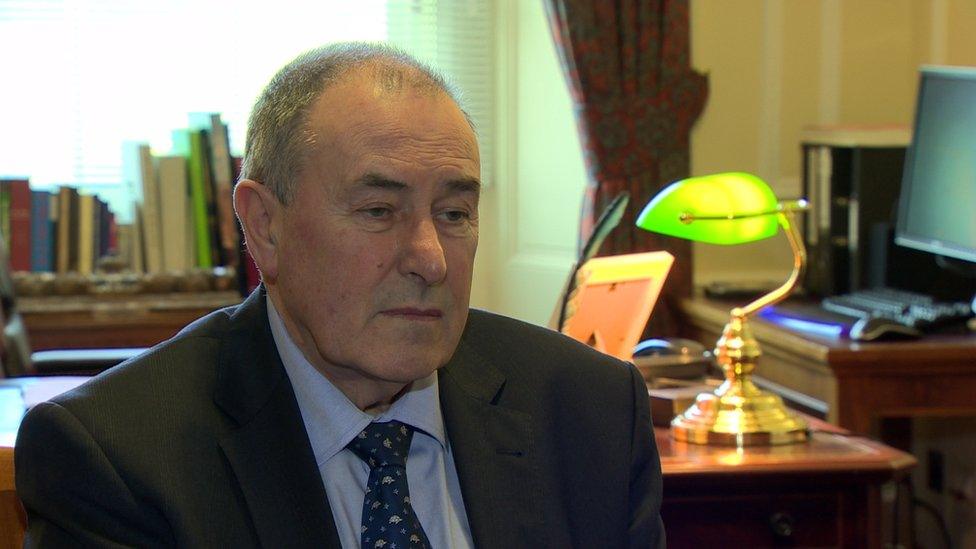NI Assembly: Time for reflection as Stormont hosts final proceedings before election
- Published

Stormont has had its last day of proceedings before the 2016 Assembly Election
The assembly doesn't dissolve officially for the next election campaign until the end of this month.
However, MLAs are holding their Easter break between now and then.
So, Tuesday's proceedings were the last scheduled for the chamber before the politicians set about defending their seats or alternatively settle down to contemplate their retirement.
Proceedings opened with MLAs' thoughts on the past five years at Stormont.
But, if there was a need for a reality check, it came at lunchtime with the confirmation that prison officer Adrian Ismay, injured in a dissident republican attack, had died.
This meant the last item to be discussed on the last day of this Stormont Assembly was Justice Minister David Ford paying tribute to Mr Ismay.

Mitchel McLaughlin, who is retiring, said he is looking forward to new MLAs bringing in a new form of politics
A personal tragedy, and a sobering reminder that the transition envisaged by the architects of the peace process is still far from over.
The speaker, Mitchel McLaughlin, pointed out that more than 30% of the MLAs elected in May 2011 are not standing, so definitely won't be back in May 2016.
He said he's looking forward to a new generation, providing a new form of politics.
Outgoing veteran SDLP MLA, Alban Maginness, described the job he used to do in north Belfast as being like a fireman tasked with putting out political fires.
Looking forward to a different future, the independent unionist Claire Sugden argued that Northern Ireland won't truly move on until the people who were involved in the Troubles are no longer involved in politics.
Stability
Predictably, the MLAs gave this extended Stormont term a mixed verdict.
From the DUP and Sinn Féin, we heard talk of 40,000 jobs created, low household rates and no prescription and water charges.
The SDLP reminded voters that the two big parties had handed "welfare cutting powers" back to Westminster.

'Self praise is a poor recommendation,' said Jim Allister on Stormont's final day
Alliance acknowledged that November's Fresh Start deal provided stability, but asked "is stability enough?"
Stormont's one-man opposition, Jim Allister, observed drily that "self-praise is a poor recommendation".
When the MLAs return after May, Stormont will have a provision for an "official opposition", provided a party has at least 8% of the assembly, or nine MLAs.
However, Mr Allister's one-man act has illustrated that while there is no official opposition yet, the ability to find the Achilles' Heel of your rivals makes all the difference in opposition politics.
Green Party MLA Steven Agnew expressed the hope that what is known as "the naughty corner" of the assembly chamber will feel emboldened in the future.
Stormont rivals
The May election will no doubt be a referendum on the achievements and failures of this extended term.
Out in the United States, the First and Deputy First Ministers are selling the planned cut in Corporation Tax.
Back on the doorsteps, their two parties' MLAs will no doubt repeat their message on attracting jobs, alongside achievements like keeping tuition fees here a third lower than in England, stopping the bedroom tax and attracting high profile events like the Giro D'Italia.
By contrast, their rivals will point to the stand offs over welfare reform and IRA activity, the failure to resolve issues related to the legacy of the Troubles, and disagreements over how to handle issues like same-sex marriage or abortion in cases of fatal foetal abnormalities.

Colum Eastwood and Mike Nesbitt are the leaders hoping to benefit from voter dissatisfaction with the assembly
At the weekend, SDLP leader Colum Eastwood set out some of his red lines for entering government - in particular, an increase in spending on vocational training, university places and apprenticeships.
In his spring conference speech, Ulster Unionist leader Mike Nesbitt was slightly more vague.
He said only that the next programme for government must be progressive and the other parties must demonstrate a collective will to deliver it.
Both parties will head into the contest proclaiming that Stormont - as things stand - isn't as good as it gets.
After May, we know for sure that instead of the current 12 departments, we will have only nine ministries in the Northern Ireland Executive.
But, whether those departments will be divided between three or five parties is more difficult to forecast.